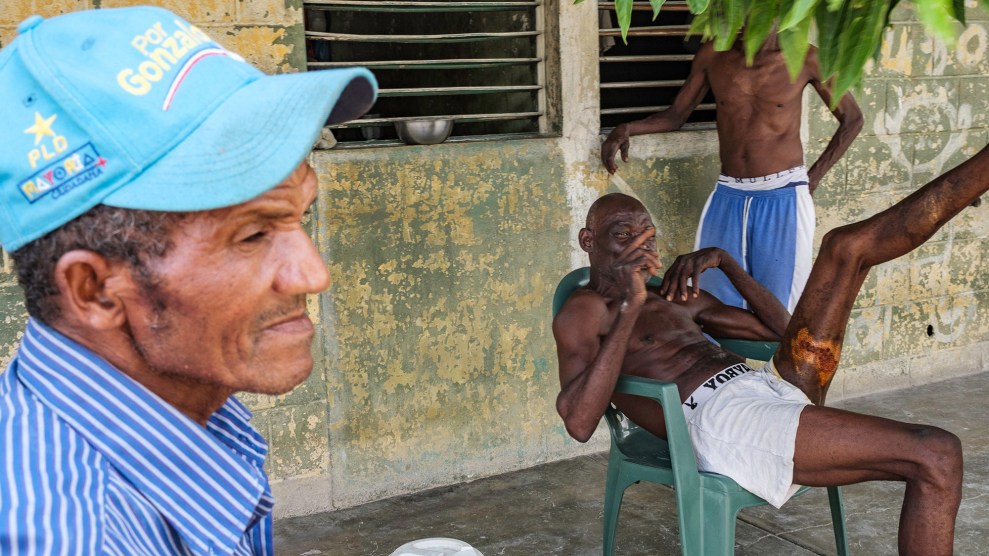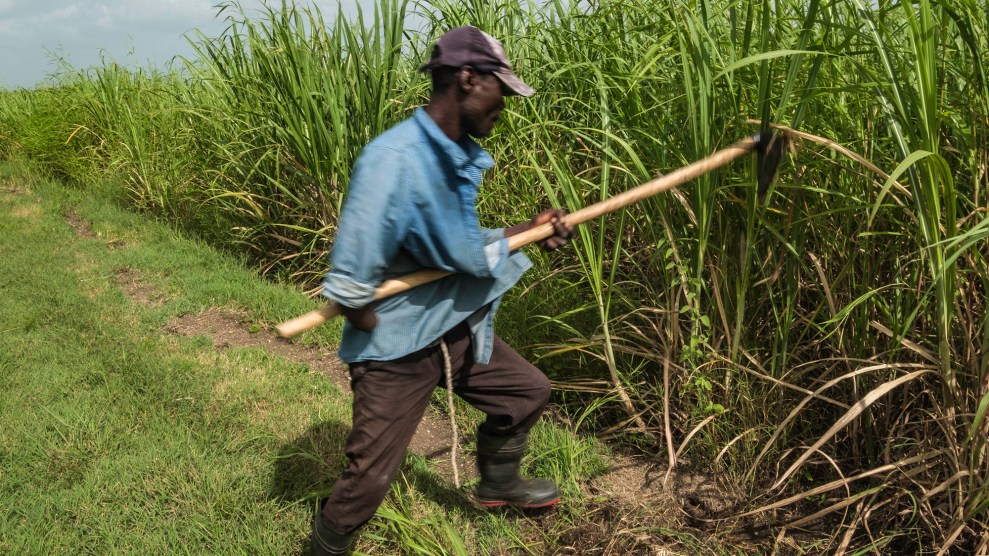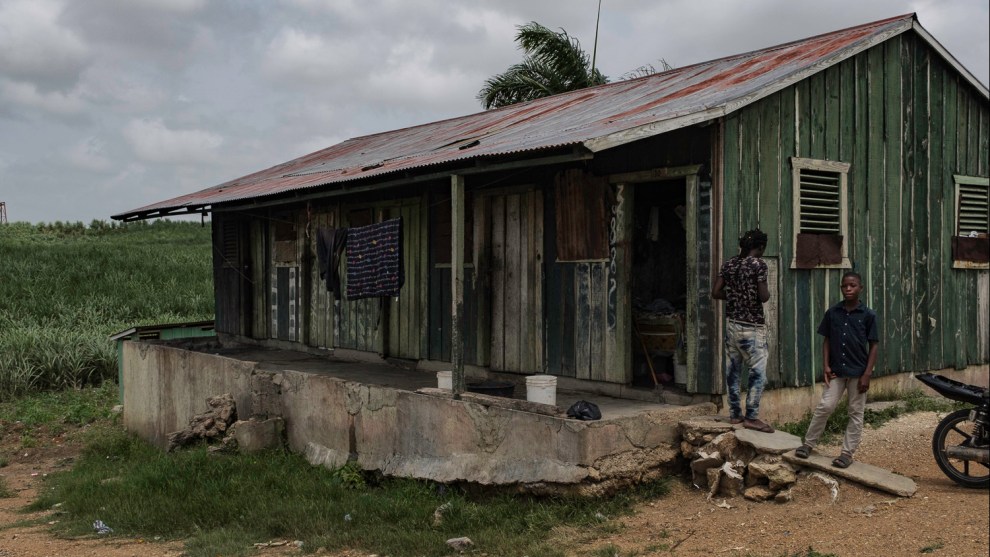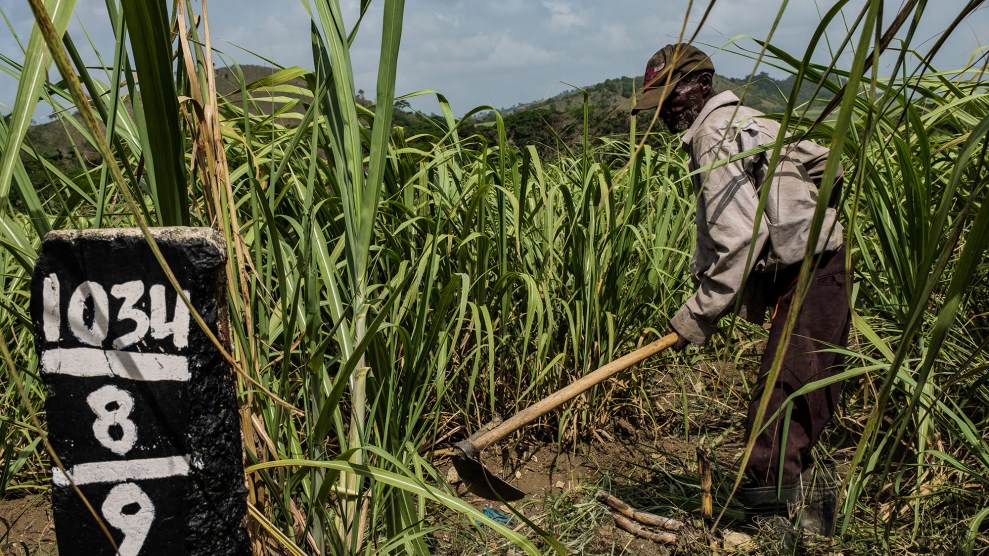
Residents of a Central Romana batey in 2021.Pedro Farais-Nardi
The Americans pulling into the luxury Caribbean resort town of Juan Dolio could have easily passed as tourists. Dressed in jeans and tennis shoes, they set up at a hotel overlooking the Dominican Republic’s southern coast. But the group, which included law enforcement officers from the US Department of Homeland Security, wasn’t traveling to enjoy the area’s world-class golf courses and palm-studded white sand beaches.
Trained to target and dismantle terrorist groups and transnational drug cartels, the special agents from Homeland Security Investigations, or HSI, were probing something very different: working conditions at the Central Romana Corp., a major exporter of sugar to the United States, whose top executive is Alfonso Fanjul, a billionaire Florida businessman.
The inquiry could represent a breakthrough in criminal accountability for labor exploitation.
The agents spent days last March secretly interviewing Haitian cane cutters, who were shuttled to the hotel from Central Romana’s sprawling nearby 240,000-acre plantation, where many workers, along with their families, live in ramshackle camps known as bateyes.
In November, months before the HSI agents’ arrival, US Customs and Border Protection (CBP) blocked imports of Central Romana sugar—which averaged about a quarter-billion pounds a year—after finding evidence of forced labor among its Haitian cane cutters.
But the HSI agents’ inquiry and deployment in the Dominican Republic, disclosed here for the first time, indicates significant new federal scrutiny of the country’s sugar industry. It could also represent a breakthrough in the application of US laws allowing corporations and their executives to be held criminally accountable for labor exploitation in their supply chains.
A series of lawsuits and reports by government agencies, civil society groups, and academics—along with extensive media investigations—have exposed grim conditions that Central Romana cane cutters and their families face, including substandard company housing, often without electricity or running water. In dozens of interviews with Reveal from the Center for Investigative Reporting and Mother Jones over the last four years, workers and their advocates have described inadequate protective gear, poor medical care, low pay, chronic debt, and intimidation by the company’s armed security force.
Alfonso Fanjul and his brother Jose “Pepe” Fanjul hold top positions at Central Romana. Their business empire includes the Dominican luxury resort Casa de Campo; major sugar brands such as Domino, C&H, and Florida Crystals; nearly 190,000 acres of Everglades-area cane fields; and the world’s largest network of sugar refineries.
An investigation by HSI that leads to criminal charges against Central Romana or the company’s leadership would be “unprecedented,” according to Kenneth Kennedy, a retired special agent with the division who directed efforts to expand its work targeting forced labor in goods imported into the US. “This could be the first time a corporation would be held criminally liable for forced labor in their own supply chains.”
Central Romana spokesman Jorge Sturla declined to confirm the existence of, or comment on, any investigation by HSI. Sturla said Elevate, a labor auditor Central Romana has arranged to consult for the company, had “found no evidence of forced labor.” He declined to provide a copy of its report.
A department spokesperson said HSI does not confirm the existence of or comment on ongoing investigations. However, four Central Romana cane field workers confirmed they met with HSI agents earlier this year. The workers, who requested anonymity fearing reprisal by their employer, told Reveal and Mother Jones that agents queried them in Spanish and Haitian Creole about their grueling work, living conditions, pay, debt, medical care, and precarious immigration status. (The vast majority of the company’s cane workers are of Haitian descent, and many are undocumented.) The agents also asked about elderly workers who, lacking access to government pensions, routinely cut cane into their 70s.
“The people from the United States government were interested in improving the situation for the Central Romana workers,” said one man who was interviewed by HSI, who reported having spent 30 years working in the cane fields.
The Homeland Security Investigations inquiry is taking place as Central Romana flexes its muscle in Washington over the export ban. Congressional disclosure reports show Central Romana has paid Akin Gump, which Sturla confirmed was hired for its “experience in international trade law,” to lobby members of the House about the ban. Another payment of $25,000 for lobbying the State Department and CBP went to the firm of James “Wally” Brewster, a US ambassador to the Dominican Republic under the Obama administration.
In August, Alfonso Fanjul, the Palm Beach–based president and CEO of Central Romana, sent a letter to former US Sen. Christopher Dodd (D-Conn.), a longtime ally of President Joe Biden who now serves as a State Department special presidential adviser for the Americas. In the letter, obtained by Reveal and Mother Jones, Fanjul said he was “terribly upset” by the forced labor allegations and asked for Dodd’s help in “requesting CBP to lift its sanctions on our company.”
“Chris, we have been friends for a long time,” wrote Fanjul, who has contributed millions of dollars to Democratic campaigns, including Dodd’s. “I am a man of honor. … I would never allow my company to treat our workers in ways that would deserve the treatment we have received from CBP.”
Fanjul’s letter, which refers to Dodd’s previous “help and advice” on the CBP ban, comes from a powerful executive whose millions of dollars in campaign donations and lobbying has helped preserve lucrative price supports for US sugar producers.
Sturla, the Central Romana spokesperson, said Fanjul had sent the letter to combat “disinformation” about the company. Dodd’s office and a State Department spokesperson both declined to comment on the letter, as did a Customs and Border Protection spokesperson.
The letter “gives a rare glimpse into the smoky backroom,” said Andrew Sullivan, a political strategist for No Big Sugar, a coalition of labor, human rights, and environmental groups pressing Congress to end the price supports. “He says the quiet part out loud, asking his ‘friend’ Senator Chris Dodd to trust him, not Customs and Border Protection. Fanjul is a man used to getting what he wants, and his frustration is palpable.” In light of the longstanding friendship Fanjul cites in his letter, Sullivan called on Dodd to recuse himself from any efforts to lift the ban.
Fanjul’s letter strongly denied that Central Romana uses forced labor, and also cited Elevate’s report, claiming it came to the same conclusion. However, he wrote that the labor auditor recommended steps to improve its handling of “employee complaints,” their “interactions with supervisors,” and “the quality of our worker housing.” Sturla says Central Romana has invested millions of dollars to improve worker housing, but experts on forced labor say those parts of the letter are unintended acknowledgements of some of the issues at the heart of the import ban.
“This letter confirms what other people have been saying,” said Duncan Jepson, managing director of Liberty Shared, an anti-trafficking group. “There are problems in how they handle complaints by workers, governance over supervisors’ conduct, housing and infrastructure.”
Jepson’s organization has partnered with US agencies, including HSI, to combat forced labor throughout global supply chains—and has provided the government with relevant evidence on Ireland’s fishing industry, an Asian palm oil company, Goodyear’s factory in Malaysia, and Central Romana’s operations. Most recently, the group filed a petition with CBP regarding Firestone Tire and Rubber Co.’s rubber plantation in Liberia. “These are very old industries,” Jepson said, “so their production methods still are very much entwined with the long history of abusive and exploitative labor practices.”
“This seems an opportunity for Mr. Fanjul to lead a program of transformative change at Central Romana,” he added.
But according to Charity Ryerson, executive director of the Corporate Accountability Lab, a labor watchdog group, instead of making the changes necessary to lift the ban, the company has so far focused on fighting it: “Central Romana has wasted the 10 months since the Customs ban was issued pursuing a political escape route rather than doing the right thing: remediating the abusive labor conditions identified by CBP and others.”
Federal laws authorize HSI to conduct and coordinate criminal investigations into US-bound supply chains that could involve forced labor. Businesses or individuals who knowingly benefit financially from forced labor can face criminal penalties, including up to 20 years in prison.
As part of his work at HSI, Kennedy helped initiate the agency’s criminal investigation into Goodyear Tire & Rubber Co. over alleged labor abuses at its factory in Malaysia. The investigation, which included interviews with overseas workers, was the first of its kind, said Kennedy, who retired from government in 2020. The inquiry was closed without criminal charges after Goodyear reached a settlement with workers last year.
Kennedy said investigators would easily be able to trace Central Romana’s supply chain of raw sugar from its Dominican plantation to US ports. But prosecutors could face significant obstacles to bringing any potential or possible criminal charges, he said, including a lack of legal precedents or political will by agency officials and lawmakers, and difficulties in getting victims to agree to testify. “These are some uncharted waters,” he said.
Central Romana has long denied the use of forced labor on its Dominican plantations. In a statement issued in the wake of the 2022 US customs ban, the company insisted it ensured “safe and productive employment” with “appropriate wages, housing and other benefits.” Yet the same statement also pledged to “engage in a dialogue” with Customs and Border Protection. Since then, the company tasked Elevate, which specializes in global supply chain issues, with examining concerns raised by the agency. Central Romana has announced salary increases, applied fresh paint to some bateyes and, as part of what Sturla described as a “multi-year” improvement plan, installed solar panels in some bateyes and demolished others, relocating occupants to “upgraded housing.” But ex-residents of one dismantled community, now living in isolated bateyes with no power, have bitterly denounced the company’s actions. Their former community had been located on a highway and was one of the estimated 10 percent of the company’s work camps with electricity. According to complaints by residents of two other bateyes, the solar installations are adequate only for charging a cellphone or lighting a single bulb.
While Sturla also cited investments in health care and education for workers and their families, former US officials and sources from nongovernmental organizations said Central Romana has appeared resistant to implementing more expansive reforms that could lead to a lifting of the trade ban.
“Labor rights advocates offered to collaborate with the company to develop an innovative, long-term solution for these workers,” said Ryerson. “Central Romana squandered that opportunity by not engaging in good faith,” declining to “do the right thing and remediate the harmful labor conditions” identified by CBP.
This story was developed in partnership with Reveal from the Center for Investigative Reporting and made possible with support from the Pulitzer Center on Crisis Reporting.
















